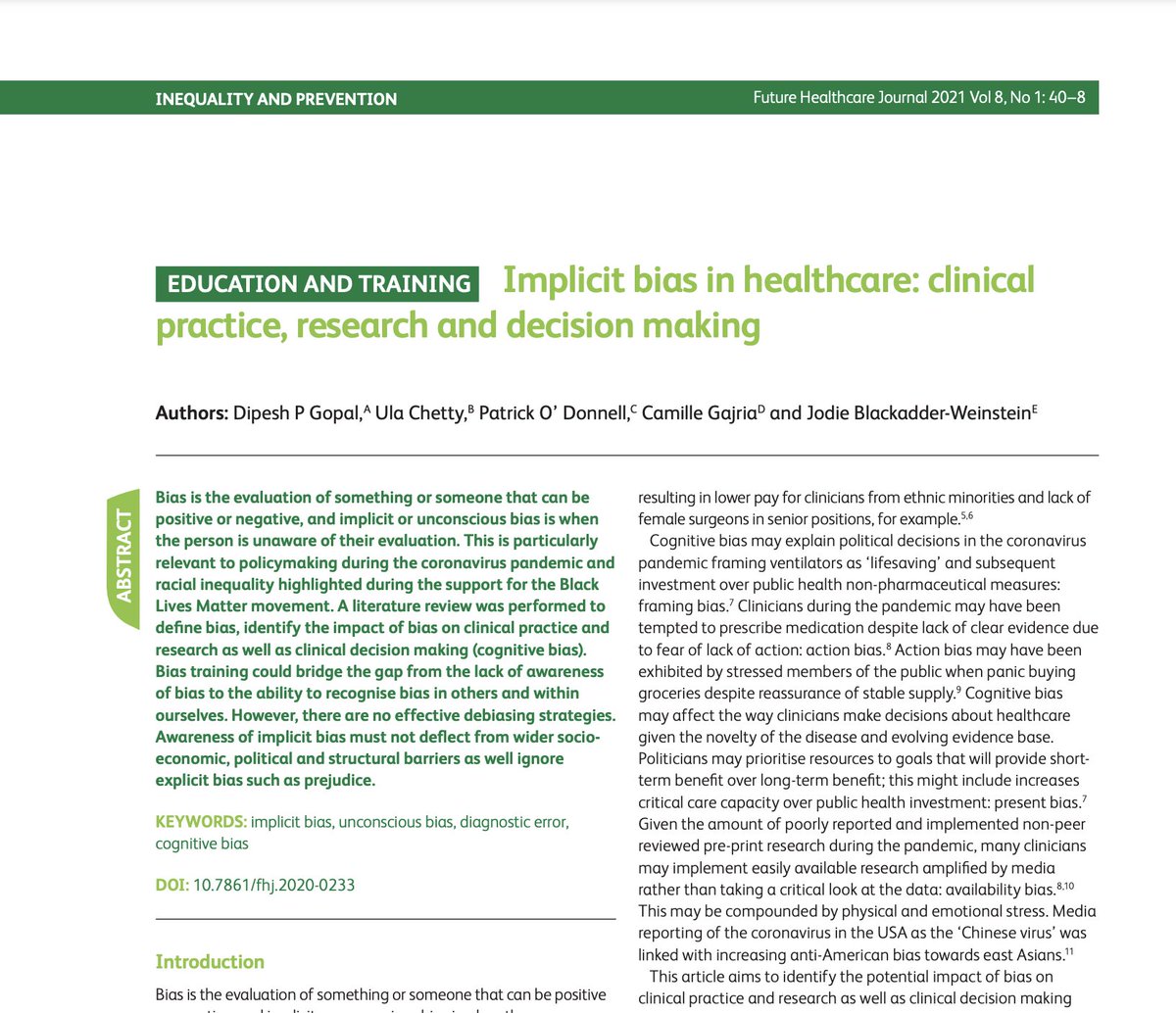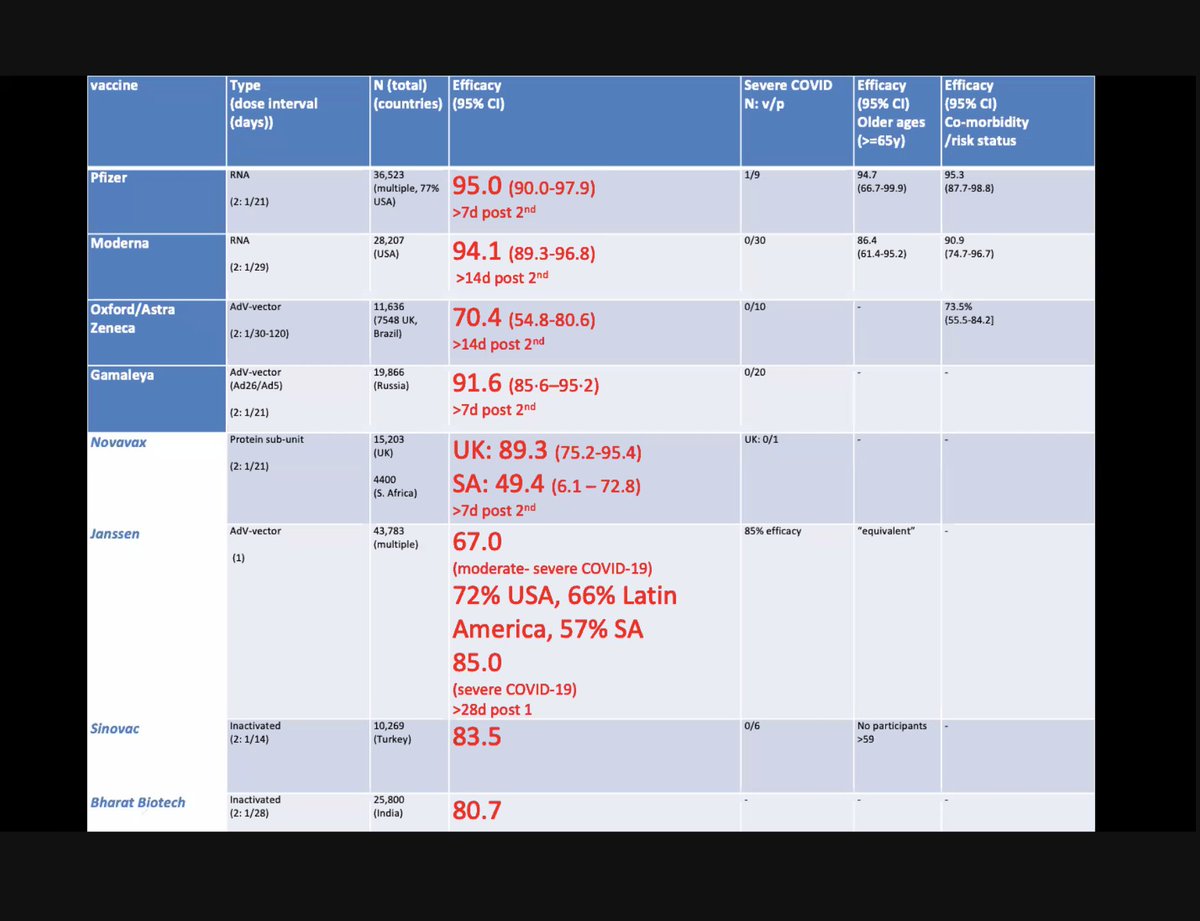
🧵 THREAD on BIAS in MEDICINE #MedTwitter #FOAMed
1a/
BIAS:
➡️ is integral to how we see people/make diagnoses: can't be removed
➡️ affects research questions that get asked, who gets funded, what gets published and in which journal
@FutureHealthJ: rcpjournals.org/content/future…
1a/
BIAS:
➡️ is integral to how we see people/make diagnoses: can't be removed
➡️ affects research questions that get asked, who gets funded, what gets published and in which journal
@FutureHealthJ: rcpjournals.org/content/future…

1b/
Bias training:
➡️ increases bias awareness
➡️ doesn't decrease biases (no evidence base)
➡️ bias training ignores communication, provides no debiasing interventions, doesn't measure motivation
➡️ doesn't address structural problems
Read: ncbi.nlm.nih.gov/pmc/articles/P…
Bias training:
➡️ increases bias awareness
➡️ doesn't decrease biases (no evidence base)
➡️ bias training ignores communication, provides no debiasing interventions, doesn't measure motivation
➡️ doesn't address structural problems
Read: ncbi.nlm.nih.gov/pmc/articles/P…
2/
Shoutout to the amazing team:
@UlaChetty
@patrickod9
@returnofcam
@jodieblackadder
And Prof @damienridge who shaped the manuscript.
Hundreds of papers, hours of lectures/books, many drafts to get here.
Thank you 🙏🏽
Shoutout to the amazing team:
@UlaChetty
@patrickod9
@returnofcam
@jodieblackadder
And Prof @damienridge who shaped the manuscript.
Hundreds of papers, hours of lectures/books, many drafts to get here.
Thank you 🙏🏽
3/
We saw outside medicine everyone was talking about bias. But we were not. Why?
Organisations make bias training mandatory for staff: qz.com/1144504/the-wo…
In California training is COMPULSORY for people-facing staff: leginfo.legislature.ca.gov/faces/billNavC…
Can they decrease biases?
We saw outside medicine everyone was talking about bias. But we were not. Why?
Organisations make bias training mandatory for staff: qz.com/1144504/the-wo…
In California training is COMPULSORY for people-facing staff: leginfo.legislature.ca.gov/faces/billNavC…
Can they decrease biases?
4a/
2 types of bias:
➡️ Implicit: we are not aware of (fast thinking) - thought to be necessary to make decisions but problematic as thought to cause 'systemic inequalities', e.g. unequal pay/treatment
➡️ Explicit: aware of (slow thinking) - overt prejudice/discrimination
2 types of bias:
➡️ Implicit: we are not aware of (fast thinking) - thought to be necessary to make decisions but problematic as thought to cause 'systemic inequalities', e.g. unequal pay/treatment
➡️ Explicit: aware of (slow thinking) - overt prejudice/discrimination

4b/
How does bias work?
➡️ Type 1: 'fast' implicit, unconscious processes due to learnt experiences/emotions/etc
➡️ Type 2: 'slow' explicit, conscious
💡 Why don't we all think slowly? - we wouldn't function as people / society. We process lots every second w/o thinking.
How does bias work?
➡️ Type 1: 'fast' implicit, unconscious processes due to learnt experiences/emotions/etc
➡️ Type 2: 'slow' explicit, conscious
💡 Why don't we all think slowly? - we wouldn't function as people / society. We process lots every second w/o thinking.

4c/
It is thought that you can measure your biases by taking a test @ProjectImplicit:
implicit.harvard.edu/implicit/
BUT whilst it is used widely, some psychologists don't believe it measures bias. Is it automation or perception?
How do you measure the unconscious mind? 😳
It is thought that you can measure your biases by taking a test @ProjectImplicit:
implicit.harvard.edu/implicit/
BUT whilst it is used widely, some psychologists don't believe it measures bias. Is it automation or perception?
How do you measure the unconscious mind? 😳
5a/
Why is it important now?
Politicians might buy up ventilators than implement public health measures - doing something is better than nothing (action bias)
Similar to experimental treatment at the beginning of pandemic - doing something is better than nothing (action bias)
Why is it important now?
Politicians might buy up ventilators than implement public health measures - doing something is better than nothing (action bias)
Similar to experimental treatment at the beginning of pandemic - doing something is better than nothing (action bias)
5b/
People talk about bias training since resurgence of the #BlackLivesMatter movement.
This ignores wider structural problems that individuals face.
Problematic data exclusions:
Skin:
blackandbrownskin.co.uk/mindthegap
Underestimation of Oxygen sats: nejm.org/doi/10.1056/NE…

People talk about bias training since resurgence of the #BlackLivesMatter movement.
This ignores wider structural problems that individuals face.
Problematic data exclusions:
Skin:
blackandbrownskin.co.uk/mindthegap
Underestimation of Oxygen sats: nejm.org/doi/10.1056/NE…


5c/
@crageshri @Dr2NisreenAlwan @soniakumar100
Problematic data inclusions:
Using race as a biological category in algorithms may very well perpetuate health inequalities:
nejm.org/doi/full/10.10…
nejm.org/doi/pdf/10.105…
@crageshri @Dr2NisreenAlwan @soniakumar100
Problematic data inclusions:
Using race as a biological category in algorithms may very well perpetuate health inequalities:
nejm.org/doi/full/10.10…
nejm.org/doi/pdf/10.105…

6a/
Examples in medicine:
Huge anti-obesity/fat bias - attributes to lack of willpower, ignoring poverty/insomnia.
It's what Dr @DrSdeG has been talking about for ages - in numbers.
journals.plos.org/plosone/articl…
onlinelibrary.wiley.com/doi/10.1002/ob…
nature.com/articles/ijo20…
Examples in medicine:
Huge anti-obesity/fat bias - attributes to lack of willpower, ignoring poverty/insomnia.
It's what Dr @DrSdeG has been talking about for ages - in numbers.
journals.plos.org/plosone/articl…
onlinelibrary.wiley.com/doi/10.1002/ob…
nature.com/articles/ijo20…

6b/
Lots of data to back up female doctors being mistaken for nurses. (I'm not saying anything wrong with being a nurse.)
liebertpub.com/doi/full/10.10…
jamanetwork.com/journals/jamai…
Lots of data to back up female doctors being mistaken for nurses. (I'm not saying anything wrong with being a nurse.)
liebertpub.com/doi/full/10.10…
jamanetwork.com/journals/jamai…
6c/
Data to suggest female doctors are thought to be subjectively less competent despite same objective competency
onlinelibrary.wiley.com/doi/full/10.11…
journals.lww.com/greenjournal/f…
Data to suggest female doctors are thought to be subjectively less competent despite same objective competency
onlinelibrary.wiley.com/doi/full/10.11…
journals.lww.com/greenjournal/f…
6d/
Thanks @CCriadoPerez @DrNighatArif
Women are less likely to be believed when they have myocardial infarctions: ahajournals.org/doi/full/10.11…
Not mentioning worse mortality when in hospital:
onlinelibrary.wiley.com/doi/full/10.10…
ahajournals.org/doi/full/10.11…
sciencedirect.com/science/articl…
Thanks @CCriadoPerez @DrNighatArif
Women are less likely to be believed when they have myocardial infarctions: ahajournals.org/doi/full/10.11…
Not mentioning worse mortality when in hospital:
onlinelibrary.wiley.com/doi/full/10.10…
ahajournals.org/doi/full/10.11…
sciencedirect.com/science/articl…

6e/
Causes of racial disparities in maternal mortality: npeu.ox.ac.uk/mbrrace-uk/rep…
Could cultural competency help here?
cochrane.org/CD009405/COMMU…
cc @teekayoki @KMeghrawi @MelaninMedics
Causes of racial disparities in maternal mortality: npeu.ox.ac.uk/mbrrace-uk/rep…
Could cultural competency help here?
cochrane.org/CD009405/COMMU…
cc @teekayoki @KMeghrawi @MelaninMedics

7a/
Bias affects which research gets funded:
Small institutions > large institutions: journals.plos.org/plosone/articl…
AND funders when unblinded prefer large institutions in the global North
healthaffairs.org/doi/10.1377/hl…
…balizationandhealth.biomedcentral.com/articles/10.11…
…rchintegrityjournal.biomedcentral.com/articles/10.11…
Bias affects which research gets funded:
Small institutions > large institutions: journals.plos.org/plosone/articl…
AND funders when unblinded prefer large institutions in the global North
healthaffairs.org/doi/10.1377/hl…
…balizationandhealth.biomedcentral.com/articles/10.11…
…rchintegrityjournal.biomedcentral.com/articles/10.11…

7b/
If research only comes from a certain number of institutions, and so do those peer reviewers and journal editors...not mentioning the actual research questions
We are missing so much research because we believe that research from certain people/places is better than others.
If research only comes from a certain number of institutions, and so do those peer reviewers and journal editors...not mentioning the actual research questions
We are missing so much research because we believe that research from certain people/places is better than others.
7c/
@angeladsaini "Science is always shaped by the time and the place in which it is carried out."
Science is not free from outside influence including society.
Shoutout to @MedCrisis who covers bias in the actual research in much more detail:
@angeladsaini "Science is always shaped by the time and the place in which it is carried out."
Science is not free from outside influence including society.
Shoutout to @MedCrisis who covers bias in the actual research in much more detail:
8/
How about policy? @justinparkhurst: library.oapen.org/bitstream/hand…
➡️ Technical bias: data ‘cherry-picking’
➡️ Issue bias: use of evidence shifts political debate in a certain direction, e.g. presenting policy with evidence from one side of debate
How about policy? @justinparkhurst: library.oapen.org/bitstream/hand…
➡️ Technical bias: data ‘cherry-picking’
➡️ Issue bias: use of evidence shifts political debate in a certain direction, e.g. presenting policy with evidence from one side of debate
9a/
💡 Is bias linked to diagnostic error ❓ Short answer can't tell as the best data is from surveys
bmcmedinformdecismak.biomedcentral.com/articles/10.11…
But clearly checklists have been shown to show human factors are important
💡 Is bias linked to diagnostic error ❓ Short answer can't tell as the best data is from surveys
bmcmedinformdecismak.biomedcentral.com/articles/10.11…
But clearly checklists have been shown to show human factors are important
10/
💡 Does bias training work in medicine ❓
NO - maybe only to increase awareness but not to decrease biases
qualitysafety.bmj.com/content/25/10/…
Outside medicine - does increase awareness: @DrDoyinA @EHRC
equalityhumanrights.com/en/publication…
@KUMEC4KCL @juheepahuja
💡 Does bias training work in medicine ❓
NO - maybe only to increase awareness but not to decrease biases
qualitysafety.bmj.com/content/25/10/…
Outside medicine - does increase awareness: @DrDoyinA @EHRC
equalityhumanrights.com/en/publication…
@KUMEC4KCL @juheepahuja

11/
Why does bias training not work?
We don't:
➡️ measure motivation
➡️ give people ways to decrease biases
➡️ give people good non/verbal communication training with bias training: communication is the mediator between bias and patient outcomes.
ncbi.nlm.nih.gov/pmc/articles/P…
Why does bias training not work?
We don't:
➡️ measure motivation
➡️ give people ways to decrease biases
➡️ give people good non/verbal communication training with bias training: communication is the mediator between bias and patient outcomes.
ncbi.nlm.nih.gov/pmc/articles/P…
12/
Dilemma:
Bias is problem AND we can't really decrease bias
So we teach it better? (tweet above)
Maybe @ProjectImplicit - with a caution too.
Dilemma:
Bias is problem AND we can't really decrease bias
So we teach it better? (tweet above)
Maybe @ProjectImplicit - with a caution too.
13/
Thank you the thousands of researchers working on bias overall.
Our team pulled everything together that's all.
@helenamacarena @TheKingsFund @yvonnecoghill1 @whynotadoc @lexmakesthings - your/appearances on podcasts is cited. 🙏🏽
ENDS
Thank you the thousands of researchers working on bias overall.
Our team pulled everything together that's all.
@helenamacarena @TheKingsFund @yvonnecoghill1 @whynotadoc @lexmakesthings - your/appearances on podcasts is cited. 🙏🏽
ENDS
@threadreaderapp unroll please, thank you
• • •
Missing some Tweet in this thread? You can try to
force a refresh










